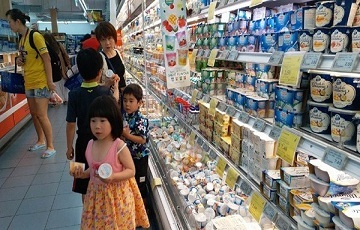Many perfume manufacturers in the world recognize Southeast Asia, what they see is the growth of the middle class along with their purchasing power, creating new demand for flavors industry, not only food but also detergents and perfumes.

In many hot and humid countries, demand for fragrances and hobbies are different, so companies must consider their strategies for these potential markets. According to a survey was conducted by Leffingwell & Associates of the United States, the global flavor and aroma market is worth $ 24.1 billion in 2015. Southeast Asia only accounts for 10% of it. However, this is growing at 7-8% per year.This is considered one of the most potential markets for expand the business.
With rising incomes, the lifestyle of Southeast Asians is increasingly similar to developed countries on the world. The demand of food flavors is increasing because more and more people choosing fabricated food for lunch and dinner. In addition, because of the hot climate, demand for products such as perfumes, detergents and soaps were look forward to increasing.
1. Focus on exploiting the potential
With such potential development, the Western and Japanese perfume manufacturers decided to invest in production expanding in the region.
Takasago International of Japan, the world's fifth-largest flavors and perfumes manufacturers, have upgraded its plant at Singapore in 2014 with a capital investment of $ 44 million, to triple its flavors and fragrances production capacity reach 30,000 tons per year. The company also purchased land near Jakarta to build the first plant in Indonesia.
Besides, Switzerland's Givaudan Group- the largest fragrance and perfume manufacturer has made its largest investment ever in 2015, to build a second non-food scent plant in Singapore and established the first perfume making school to in Asia.
Givaudan acknowledges Southeast Asia is a strong growth market and is also the foundation of its business strategy until 2020. The Group focuses on some countries such as Indonesia and Myanmar, which have a growing population to expand their business.
International Flavors & Fragrances (IFF) Company of The USA – the third largest perfume manufacturer in the world, doubled the size of food flavoring plant in Jakarta to 1,500 square meters in 2014.
In markets such as Japan, the United States and Europe, perfume manufacturers have a close relationship with consumer goods manufacturers. However, in the Southeast Asia developing market, these relationships are not strong because the opportunity belongs to smaller perfume makers.
Japan's Hasegawa, the 11th largest perfume maker in the world, has got their position by focus on flavor products for foods that suitable for Islamic dietary rules. This company bought Peresscol perfume manufacturer of Malaysia in 2014 and now is expanding its marketing channels in Malaysia and Indonesia, where there are many Muslims.
Through these activities, the Japanese perfume manufacturer hopes to increase their profits in Asia from 80%, approx. 3.3 billion JPY($ 29.5 million) in 2020.
2. Focus on the difference
Climate and culture are two main factors that make a difference in regional and national flavors. In order to find the best-selling perfume, many companies must always research and survey the market.
For example, In South-East Asia with hot and humid weather, locals prefer shampoos that have a strong scent because the scent can last even when they sweat. However, there are differences between countries in the region. For example, some common perfumes in India and Vietnam are not popular in Philippines because they are related to funerals. In Thailand the sweet scent with pink became more popular.
In last March, Takasago of Japan sent a team of four marketing staffs to the Philippines to meet the consumers directly and listen to their comments. These surveys reveal some unexpected information about the use of products, such as people use powdery detergents to clean the floor and spray the fabric softener to replace air freshener and insect repellents. According to this information Takasago developed new fragrances for their customers, which are consumer goods manufacturers.




